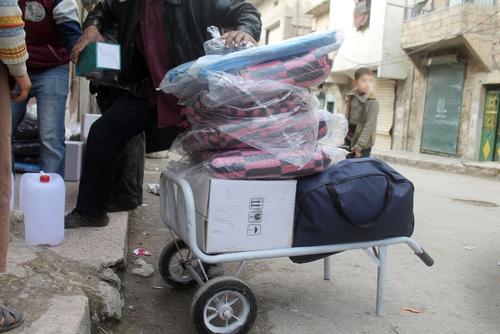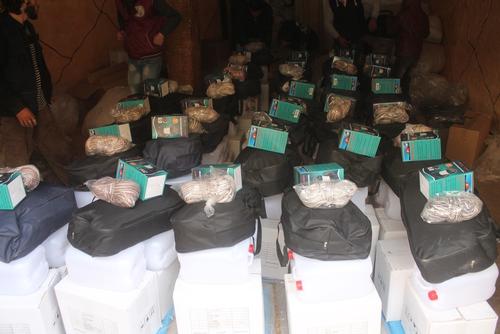MSF teams have managed to deliver urgently needed aid to thousands of people in the city of Aleppo (Syria) which is going through its fifth winter of civil war. In partnership with the Aleppo City Local Council, 5,200 winter and hygiene for displaced families were distributed in the first weeks of December. A further 2,600 kits are due to be delivered in the coming days.
The kits were distributed according to the needs of each family and they include items such as winter clothes, blankets, tarpaulins and ropes, jerry cans, torches and different hygiene equipment.
The ongoing conflict and insecurity in the area have hindered the distribution of non-food items by NGOs despite the increasing number of vulnerable people. The distribution was carried out in different neighbourhoods following a needs assessment and it included families whose houses have been damaged by recent bombing and shelling.
“Close to 40,000 people will be covered by this distribution that aims to help them cope with the harsh conditions in which they have to live because of the conflict and the lack of resources,” says Carlos J. Francisco, coordinator of MSF projects in northern Syria. “After nearly five years of war, the humanitarian situation in Aleppo and its surroundings is becoming almost unbearable for a significant part of the population.”
“Every day we see attacks on residential areas and critical civilian infrastructures, such as hospitals or the city water distribution system. Ambulances, markets or bakeries are targeted and destroyed and that it makes increasingly difficult and dangerous for people to access the most basic services, including medical and humanitarian assistance,” says Francisco.

The protracted conflict combined with harsh winter conditions is worsening the already critical situation of displaced people inside the city. Out of an estimated 300,000 people currently living in eastern Aleppo, approximately 55% (176,000) have been displaced because of the conflict. Of these, almost two-thirds have been forced to move more than once. Although the displaced population consists largely of inhabitants from the city itself, the current intensification of the conflict in Hama and Idleb – to the south of Aleppo – has forced at least 3,800 families to flee from these two areas. And that figure is likely to increase.
The ancient city of Aleppo, the second largest in the country (with an estimated one million people before the war) has been one of the front lines in this bitter conflict. Whole quarters have been destroyed by explosions and years of semi-siege. Many neighbourhoods don’t have electricity or running water.
The main road from Kilis in Turkey to Aleppo was almost completely cut off from humanitarian aid a few days ago. Several convoys were bombed and a truck used to deliver winter kits to families in Aleppo was fired on, which led to a temporary halt in the distribution. The road is not only the key supply route into the besieged eastern part of the city but is also essential for providing all the food, fuel and humanitarian aid for some 600,000 people living in the whole area.
MSF runs six medical facilities across northern Syria, and directly supports more than 150 health posts and hospitals across the country, many of them in besieged areas. Most are temporary structures run by Syrian doctors, without MSF staff, but provided with practical support and distance learning by MSF to help them deal with the extremely high level of medical needs.




